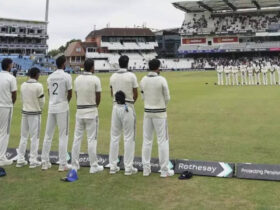South African Cricketer Marizanne Kapp Reprimanded for ICC Code of Conduct Breach
South African all-rounder Marizanne Kapp has faced reprimand for violating Level 1 of the ICC Code of Conduct during the first ODI of the ICC Women’s Championship series against Sri Lanka. The match took place in East London on Tuesday.
Kapp was found guilty of breaching Article 2.3 of the ICC Code of Conduct for Players and Player Support Personnel. This article pertains to the “use of an audible obscenity during an International Match.”
As a consequence, Kapp’s disciplinary record now carries an additional demerit point. This is her second offence within a 24-month period, bringing her total demerit points to two.
Kapp’s first demerit point was earned during the third Women’s T20I against Sri Lanka earlier this month.
The incident on Tuesday transpired in the 44th over of South Africa’s innings, when Kapp used inappropriate language following her dismissal.
Kapp acknowledged the offence and accepted the sanction proposed by Shandre Fritz of the Emirates ICC International Panel of Match Referees, eliminating the need for a formal hearing.
The charge was levelled by on-field umpires Karren Klaaste and Jacquline Williams, third umpire Lauren Agenbag, and fourth umpire Thomas Mokorosi.
Level 1 breaches carry a minimum penalty of an official reprimand, a maximum penalty of 50 per cent of a player’s match fee, and one or two demerit points.
Details on Kapp’s previous Code of Conduct offence can be found here.
Notes for Editors:
- When a player accumulates four or more demerit points within a 24-month period, these are converted into suspension points, leading to a ban.
- Two suspension points equate to a ban from one Test or two ODIs or two T20Is, whichever comes first for the player.
- Demerit Points remain on a Player or Player Support Personnel’s disciplinary record for a period of twenty-four (24) months from their imposition, after which they are expunged.





















